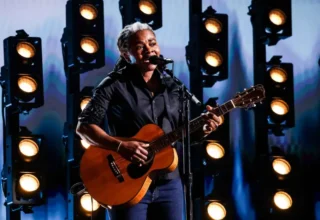
In the annals of Oscar history, Emma Stone beating Lily Gladstone for Best Actress will not go down as a Moonlight-level surprise. Both women were running neck and neck throughout the season, with Stone winning BAFTA and Gladstone taking SAG. Still, though, given that the vast majority of pundits had predicted Gladstone to pull out the win, Stone winning her second Oscar was the most unexpected development on a night that mostly went chalk. (As had been apparent since July, Oppenheimer was the night’s big winner.) So, while the engraving is still hot on Stone’s Best Actress trophy — I’m literally watching them do it as I type — let’s dig in. What made voters say, “Too bad, Gladstone, we’ve gotta have Stone”? I can think of three possible reasons, none of which are mutually exclusive.
Category Confusion
Like The Fabelmans’ Michelle Williams last season, Gladstone was originally pegged as a Supporting Actress front-runner before revealing that she would run in Lead. That decision is certain to be relitigated by Oscar obsessives in the years to come, but it’s worth noting that the move made sense in the context of Killers of the Flower Moon’s Oscar campaign, which emphasized how the film’s script had been revamped in preproduction to better center the Osage point of view. In that light, running Gladstone in Supporting would undercut the campaign’s core message — the whole point was that she was on equal footing with co-star Leonardo DiCaprio. Though the move didn’t pay off at the Oscars, it may still have been the right call for Gladstone’s career. As Kyle Buchanan noted, “By going lead, Lily told Hollywood to treat her like a lead. And she just booked another lead, which many supporting winners struggle to do.”
However, it takes nothing away from Gladstone’s performance to note that her character is nevertheless out of commission for long stretches of the film. On the whole the film does privilege DiCaprio’s character’s point of view, in a way that rankled some critics. Stone did not suffer from a similar issue. She was at the center of everything, in a film that was all about her character’s journey of self discovery.
The International Contingent
The addition of hundreds of international voters may well end up being the greatest legacy of the Academy’s post-#OscarsSoWhite reinvention. You could see their impact all over this year’s results. A French film won Original Screenplay; two Japanese films won Animated Feature and Visual Effects; and a British film made in Poland and told in German won Sound. But I think these international voters also may have swung it toward Stone. Most of the upsets we saw on Sunday were mirrored at BAFTA, whose membership is similarly global. And BAFTA snubbed Killers in multiple key categories, including Gladstone in Actress. At the time, it was tempting to chalk this up to the Brits’ strange nomination process, but with hindsight it seems apparent that international voters, who perhaps had more emotional distance from the genocide of Native Americans, simply didn’t respond to Killers the way their U.S. counterparts did.
The Narrative
I always say that the Oscars are not sports. There’s no way to look at the stats and say who “should” have won. That’s why things like narrative matter: If the notion of a best performance is forever subjective, then it makes sense to look to extratextual factors to see who’s got the edge. In this case, those clearly tipped it to Gladstone. Had she taken the trophy, the Blackfeet actress would have been the first Native American performer to win an acting Oscar, a moment you can imagine some voters feeling was too good to pass up. Furthemore, Stone had the disadvantage of having won before, and fairly recently. (She last won for La La Land in 2017.) But as Daniel Joyaux, the rare pundit to correctly predict Stone, noted, the modern Academy is more resistant to so-called narrative wins than their predecessors. As when Glenn Close lost to Olivia Colman in 2019, and when the late Chadwick Boseman lost to Anthony Hopkins two years later, Gladstone losing to Stone was “a presumed narrative winner falling to someone who voters thought just gave an all-time great performance.” (Note too that, in two of those cases, the ceremony’s producers reshuffled the order of the categories in the hopes of climaxing on an historic acting win.) Since Venice, Stone’s performance in Poor Things was heralded as a career-best achievement. In the end, that turned out to matter more than anything else.







